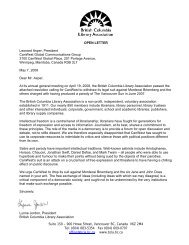Create successful ePaper yourself
Turn your PDF publications into a flip-book with our unique Google optimized e-Paper software.
KEVIN LANGDALE ILLUSTRATION<br />
WORK WITH ME, PEOPLE<br />
CUSTOMERS GOT YOU STRESSED? FIGHT BACK<br />
BY PIETA WOOLLEY<br />
| GEORGIA STRAIGHT MIND BODY SOUL | | FALL 2005 |<br />
22<br />
are 300 rowdy folks in the audience on<br />
There Friday night at Yuk Yuk’s, and they’re<br />
there for a reason: they need to laugh. Some are<br />
angry at their wives; some are frustrated with their<br />
bosses; and some are flat-out bored. It’s seasoned<br />
comic Peter Kelamis’s job to turn all that around. No<br />
pressure.<br />
“Every time you go on-stage, you’re trying to look<br />
natural while performing the most unnatural act,”<br />
he told the <strong>Georgia</strong> <strong>Straight</strong>. “They’re not hoping<br />
you’re going to be funny. They’re expecting you to<br />
be funny. That’s the reality of the situation….Sometimes<br />
they heckle or stare blankly, and that gets you<br />
feeling pretty shitty.”<br />
Work stress is one thing if your coworkers are your<br />
only concern. But when you work with the public—<br />
like Kelamis does, as do Vancouver’s waiters, nurses,<br />
bus drivers, police officers, baristas, and other brave<br />
folk—it’s a whole new level of panic. These people<br />
have to deal with you every day. And your type can<br />
be real jerks.<br />
Most of us have seen the surly bus passenger who<br />
wants to board without paying; the customer ordering<br />
food at a counter while talking on<br />
his cellphone; or the emergency room<br />
patient who demands to be seen first,<br />
though her injuries don’t warrant it. Then<br />
there’s the classic example of parents<br />
who trash a teacher because their child<br />
failed a test.<br />
The public can be a handful, but pressure<br />
comes from the top, too.<br />
“People on the front lines are always<br />
caught between the public and their<br />
bosses,” explained counselling psychologist<br />
David Granirer. “Some of the public’s<br />
demands are reasonable, others are<br />
not. But the managers are saying, ‘Just<br />
get it done, and get it done faster.’ ”<br />
Anyone who has witnessed a Monday-morning<br />
espresso lineup, with<br />
barking, annoyed customers waiting<br />
for their extra-hot soy half-caf latte on<br />
one end of the counter, and a manager<br />
with steam coming out his ears on the<br />
other, has firsthand knowledge of that.<br />
Granirer knows that work stress is no<br />
laughing matter. A social worker and a crisis-centre<br />
help-line voice for years, he understands what it’s<br />
like to be caught in the middle. Not only that, frontline<br />
workers don’t often get to benefit from de-stressors<br />
like staff retreats. The public, and most frontline work,<br />
are by nature just bloody stressful.<br />
That said, Granirer believes the best way to handle<br />
stress mentally is to laugh.<br />
“The more powerless you are, the more you need<br />
a sense of humour,” he said. Granirer also delivers<br />
company seminars to hotel staff, Wendy’s employees,<br />
health-care workers, and civil servants. Throwing a<br />
rubber chicken into a fast-paced, tense situation can<br />
make all the difference, he argued.<br />
“We need a psychological mechanism that acknowledges<br />
the frustration, but shields you from the<br />
psychological effects of the stress. That’s exactly<br />
what humour does.”<br />
Especially sick, black humour. Imagine the TV<br />
show M*A*S*H without the comedy, he suggested.<br />
It would be pretty bleak. Granirer explained that<br />
humour can create a fast, tight bond with coworkers,<br />
something that’s indispensable when working<br />
Make my day<br />
Counselling psychologist David Granirer’s tips for making frontliners’ lives less stressful<br />
For customers<br />
+ A smile works wonders and changes the mood immediately. Humour<br />
doesn’t have to be funny; it’s just “acts of surprise that create good feelings”.<br />
Small acts and a kind word have a huge impact.<br />
+ Acknowledge the staff person. They notice who doesn’t.<br />
+ Learn how to complain without humiliating others. When you approach<br />
someone aggressively, it triggers a fight-or-flight response, and you’re less<br />
likely to get what you want.<br />
For managers<br />
+ Your role is to give the people on the front lines a chance to express their<br />
sense of humour. In meetings, ask, “Who’s got a horror story for this week?”<br />
Everyone’s got one. Or make a Top 10 Annoying Things Customers Do list.<br />
Just don’t let anyone outside the workplace see it!<br />
For workers<br />
+ Pay attention to morale at your workplace. Do your best to ensure your<br />
coworkers don’t dread coming in each morning.<br />
in a psychologically crushing environment.<br />
Still, it’s not a panacea. Humour is great for distracting<br />
workers from their stress, like Kelamis’s audience<br />
members. But ultimately, the work stress is still there.<br />
There’s no humour in the effects stress can have on<br />
the body.<br />
Kitsilano-based naturopathic physician Lorne Swetlikoff<br />
estimates that 80 percent of his patients come<br />
to see him with an illness caused by stress. It’s a trigger<br />
for the serious stuff, including cardiovascular disease.<br />
Plus, watch out for chronic fatigue, irritability,<br />
depression, insomnia, stomachaches, migraines, ulcers,<br />
colitis, anger, and anxiety, because they can all<br />
be triggered by work stress, according to the Web<br />
site of Alberta’s Anxiety Centre.<br />
“It’s the way the body protects itself,” Swetlikoff<br />
told the <strong>Straight</strong>. “You get sick, so you can’t do much.<br />
On a temporary basis it’s managed this way, but on a<br />
chronic basis, it’s not.”<br />
When you’re stressed, your adrenal gland creates<br />
more than 50 hormones to combat it, Swetlikoff explained.<br />
Over time, when stress is perpetual, those<br />
hormones wear down, or wear out. Normally, stress<br />
hormones are in their best shape between<br />
the ages of 20 and 35. After that,<br />
they fade.<br />
good news is there are ways to<br />
The fight back. Although Swetlikoff<br />
warned that every person experiences<br />
stress differently and should see a professional,<br />
he said that licorice root, ginseng,<br />
ashwagandha, and maca are usual<br />
prescriptions for a stressed body and<br />
mind. In addition, vitamins C and B5 help<br />
the body make cortisol and adrenaline.<br />
Generally, taking good care of your<br />
body is a great start, he said. Cut sugar,<br />
eat more protein, cut carbs, and eat<br />
more frequently to stabilize your blood<br />
sugar. Get at least eight hours of sleep<br />
per day. It sounds simple, but Swetlikoff<br />
emphasized the importance of not<br />
pushing your limits.<br />
“It’s really important to identify what<br />
the stress is, and find strategies to combat<br />
it,” he said. “You can’t say, ‘Well, I







